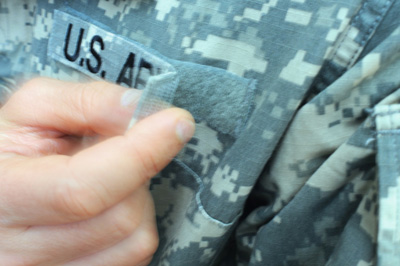By C. Todd Lopez
WASHINGTON (June 11, 2011) -- The voice of the Soldier has been heard: the Army announced the patrol cap will replace the black wool beret as the default headgear for the Army combat uniform.
Also changing are the options for how Soldiers can attach certain items to their ACU shirts. Army Chief of Staff Martin E. Dempsey said Soldiers will soon be able to sew on name tapes, service tapes, rank insignia and skill badges, instead of using Velcro.

The changes were made after Dempsey received input from Sergeant Major of the Army Raymond F. Chandler III, who had been tasked to gather opinions from Soldiers in the field.
"I am a scout for General Dempsey, who asked me to look into everything a Soldier wears from the top of his head to the bottom of his feet," Chandler said. "These are changes that the field said they wanted to see."
Typically, uniform changes come as a result of a board that meets twice a year. But Chandler said issues surrounding both the ACU headgear and the use of Velcro were changes the Army chief of staff wanted to bring to the Secretary of the Army immediately.
Chandler said he spoke with "several thousand" Soldiers and also received comments via social media sites, like Facebook. "I have also discussed this with my board of directors -- the most senior sergeants major of our Army," Chandler said. Post-deployment combat uniform surveys were used as a basis for the changes.
The No. 1 and No. 2 issues, Chandler said, involve the beret and Velcro.
"The Soldiers didn't like the fact that the beret was hot -- it was not something that they wore the majority of the time," he said. "And they didn't like the fact it didn't shade the sun and it took two hands to put on. And they didn't like to carry two pieces of headgear to do different functions during the day."
The beret has been the standard headgear for the Army's ACU -- the camouflage uniform worn by most Soldiers. But most Soldiers still needed to switch to the patrol cap based on the work they were doing -- in a motor pool or in the field, for instance.
Those Soldiers would have to carry two pieces of headgear with them, one in each pocket, and switch depending on what they was doing. In the field, they put on the patrol cap. Back on base, they'd have to switch to the beret.
The new policy will make the patrol cap the standard. But the beret isn't going anywhere. It will remain as the standard for the Army service uniform, and as an optional uniform item with the ACU -- at the discretion of commanders.
"They could choose to say for an event, like change of command, that they want them to wear the beret," Chandler said.
The change in the beret policy will save the Army about $6.5 million over the lifecycle of the ACU. New Soldiers had been issued two berets, now they will be issued one.
Chandler pointed out that Soldiers didn't ask to eliminate the beret -- just to change when it's worn. "Soldiers said we don't want to wear it with this uniform ... but they do feel they look very professional wearing it with the Army service uniform," Chandler said.
The Army implemented a mandatory wear date for the ACU in April 2008. The ACU, a replacement for the Battle Dress Uniform, featured many design changes. Included among those were a different cut for the fabric, new placement for pockets and a new "digital" color pattern. Also included were Velcro fasteners that allowed pockets to be sealed shut, sleeves to be cinched down, and rank insignia, name tapes, service tapes, patches and skill badges to be added and removed at will -- without time-consuming and sometimes costly trips to clothing alterations.
Still, some Soldiers were displeased with Velcro on the uniform, Chandler said.
The Army's new policy on attaching accouterments to the ACU will allow Soldiers to sew on rank insignia, the name tape and the service tape. Additionally, skill badges such as the Airborne, pathfinder, combat action, combat infantryman's, and expert infantryman's badge will also be authorized for sewing.
Currently, those badges are provided in painted metal and have to be pinned to the uniform. Pinning badges to the uniform can be a lengthy process because they have to be aligned using a ruler. The new policy will allow Soldiers to sew those badges to the uniform.
Combat and unit patches on the left and right sleeve and the U.S. flag will remain Velcro-only, the SMA said. Additionally, the ACU will continue to come with Velcro in the same locations it is now. Where a Soldier is authorized to sew something on, they will sew it on top of the Velcro.
Chandler also said Soldiers had asked for changes to how cargo pockets are fastened. Velcro had been used -- now, ACUs are available with buttons used to keep the pockets closed. A similar change is being discussed for how sleeve cuffs are fastened, but Chandler said that decision will be made by the July uniform board.
A more localized uniform decision will affect Soldiers assigned to the Army's headquarters at the Pentagon in Washington, D.C. There, Soldiers had been wearing the ACU as their daily uniform. By as early as October, those Soldiers will show up to work in the Army service uniform, Chandler said.
"Our perspective is that this is the corporate part of the Army," he said. "The business-part of the Army is done in the Pentagon, and as a professional there are certain standards of attire associated with certain activities. For the business aspect of the Army, it is the Army service uniform."
Implementation dates for the announced changes have not yet been decided. Soldiers should wait for direction from their commands before implementing any uniform changes.